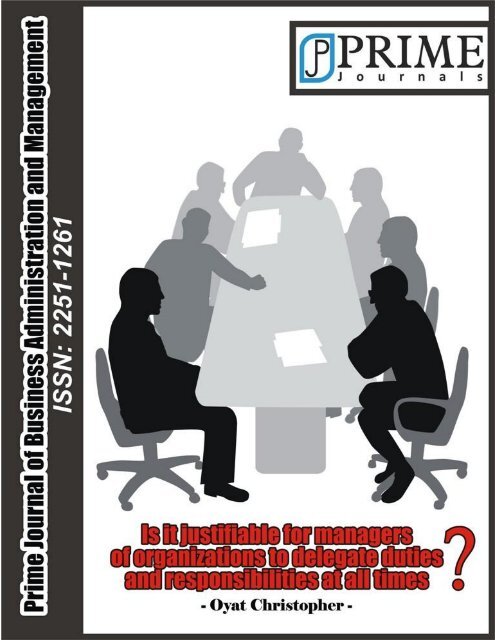Oyat (610).pdf - Prime Journals
Oyat (610).pdf - Prime Journals
Oyat (610).pdf - Prime Journals
You also want an ePaper? Increase the reach of your titles
YUMPU automatically turns print PDFs into web optimized ePapers that Google loves.
<strong>Prime</strong> Journal of Business Administration and Management (BAM)<br />
ISSN: 2251-1261. Vol. 3(6), pp. 1096-1098, June 26, 2013<br />
www.primejournal.org/BAM<br />
© <strong>Prime</strong> <strong>Journals</strong><br />
Short Communication<br />
Is it justifiable for managers of organizations to<br />
delegate duties and responsibilities at all times<br />
<strong>Oyat</strong> Christopher<br />
Senior lecturer, Department of Development Studies, Gulu University, Uganda.<br />
Accepted 17 th June, 2013<br />
Delegation is an interesting subject matter among several contemporary scholars and management<br />
practitioners. The study appreciates that effective delegation of power is as old as the biblical era of prophetic<br />
ministry of evangelism; and yet there have been some managers who have not paid heed to what it means to<br />
effectively enforce the ethos of delegating power and authority. To this extent, this research paper delves<br />
deeper, and on the basis of experience gained overtime by the researcher, to underscore the need and benefits<br />
of effective delegation of duties and responsibilities if an expanding organization is to be successful in<br />
executing its mandatory obligations. The study notes that effective delegation of duties and responsibilities<br />
should not just be taken for granted, it should an inbuilt process in an organization which should be nurtured<br />
and enabled to be part and parcel of an organization’s culture.<br />
Key words: Delegation, duties and responsibilities.<br />
INTRODUCTION<br />
Background<br />
Experience has shown that it is important for<br />
organizations to explore ways and means of creating the<br />
best possible balance between control from the centre<br />
and delegation throughout the rest of the system in<br />
management. It is known that delegation and<br />
empowerment are centred on issues of authority,<br />
responsibility and power. According to Cole (1996),<br />
delegation is essentially a power-sharing process in<br />
which individual managers transfer their legitimate<br />
authority to subordinates or team members, but without<br />
passing on their own ultimate responsibility for the<br />
completion of the overall task which has been entrusted<br />
to them by their superiors. It is argued that the fulfillment<br />
of practically every task in an organization requires a<br />
certain amount of authority or the right to act in a certain<br />
way (Drucker, 1985).<br />
Delegation may also be looked at as the practice of<br />
assigning jobs to people and giving them the authority to<br />
see the job done. It is the act of assigning formal<br />
authority and responsibility to subordinates.<br />
Responsibility comes along with accountability. The<br />
delegated remains accountable to the one who delegates<br />
(College of Professional Manual, 1996).<br />
Urwick (1952) argues that insecure managers or persons<br />
will tend to delegate at the lower end. This may be<br />
basically because of fear that the most immediate staff<br />
member may perhaps take over the mantle of power over<br />
time because of better performance always exhibited.<br />
However, there are ways in which delegation can be<br />
made safer for managers. Even confident and<br />
experienced managers will not want to take unnecessary<br />
risks of delegation. Good practice of delegating in<br />
situations where either the team is newly formed, is likely<br />
to include the following principles:<br />
- Ensure that the objective is made clear;<br />
- Indicate the standard of performance that is required;<br />
- Decide what level of authority to grant;<br />
- Allocate adequate resources in terms of staff, funds,<br />
equipment/facilities and expense;<br />
- Ensure that clear reporting arrangements and lines are<br />
made;<br />
- Encourage subordinates to request further help if<br />
needed;<br />
- Inform subordinates that early mistakes will be used as<br />
learning opportunities;<br />
- Ensure that the task is completed according to agreed<br />
standards;<br />
- Provide any advice or further resourcing that may be<br />
required if the task has proved to be difficult than anyone<br />
had first anticipated; and<br />
- Thank the individual for the efforts made (Peters, 1988).
1097 Prim. J. Bus. Admin. Manage.<br />
Case scenarios on delegation for reflection<br />
Moses and delegation<br />
Delegation is considered to be as old as what is cited in<br />
the Good News Bible. The principles and practice dates<br />
as far back as 6,000 years ago! The case of Moses in the<br />
Old Testament reading is reminiscent of this notion. The<br />
testament ethos asserts that on the morrow, Moses sat to<br />
judge the people, and the people stood about Moses<br />
from morning till evening (Good News Bible, 1976). When<br />
his father-in-law came and found him executing his duties<br />
and responsibilities, he said:<br />
“What is it that you are doing for the people Why do you<br />
sit alone, and all people stand about you from morning till<br />
evening” And Moses said to his father-in-law, “because<br />
the people come to me to enquire between a man and his<br />
neighbor, and I make them know the statutes of God and<br />
His decisions”.<br />
After a moment of reflection, Moses’ father-in-law said<br />
him to as follows:<br />
“What you are doing is not good. You and the people will<br />
wear yourself out, for the thing is too heavy for you; you<br />
are not able to perform it alone. Listen now to my voice; I<br />
will give you counsel, and God be with you! You shall<br />
represent the people before God, and bring their cases to<br />
God; and you shall teach them the statutes and the<br />
decisions, and make them know the way in which they<br />
must walk and what they must do. Moreover, choose able<br />
men from all the people, such as those who fear God;<br />
men who are trustworthy and who hate a bridge; and<br />
place such men over the people as rulers of thousands,<br />
of hundreds, of fifties, and of tens. And let them judge<br />
people at all times; and every great matter they shall<br />
bring to you, but any small matter they shall decide<br />
themselves; so it will be easier for you, and they will bear<br />
the burden with you. If you do this, and God so<br />
commands you, then you will be able to endure and all<br />
these people also will go to their places in peace”<br />
(Exodus, 18-13-27).<br />
Eventually Moses paid heed to the voice of his fatherin-law<br />
and did all that he could as suggested. Moses<br />
chose competent men out of Israel, and made them<br />
heads over people; rulers of thousands, of hundreds, of<br />
fifties and of tens. And these leaders were able to judge<br />
people at all times; hard cases could be referred to<br />
Moses for appropriate action, and small matters could be<br />
decided by appointed leaders. With this delegation of<br />
power and authority, Moses became a relieved man!<br />
Dr Bruce Duncan and delegation<br />
In his article “To Delegate” – the bête noire of<br />
Entrepreneurs” (In Veritas, Journal, Vol.2, No.3, August<br />
2011), Duncan argued and alluded to the notion that<br />
entrepreneurs must not fall prey to business astigmatism,<br />
navel gazing and self adulation that ignore the delegation<br />
of power and authority to others. He vehemently argued<br />
that a short sighted and ego-centric approach to business<br />
entrepreneurship is counterproductive and creates the<br />
tombstone heralding an early organizational death in the<br />
wake of immeasurable collateral damage. He concluded<br />
his views by emphasizing that delegation of power and<br />
authority tend to revolutionize lives, and above all lift the<br />
frustration of many who have to wait in the wings whilst<br />
one person does everything and, more often than not,<br />
does a second rate job! He emphasized that delegation is<br />
bound to bring changes in organizations for the better.<br />
Business expansion and delegation<br />
Let us assume that a given business is successful and<br />
that the owner decides to expand it, or that the<br />
circumstances force the owner to do so. Such an<br />
expansion may necessitate moving to larger premises or<br />
opening a branch or making some internal changes. It is<br />
unlikely that the owner or manager of a given business<br />
enterprise will himself or herself be able to cope with the<br />
increased workload; and so it will be necessary for him or<br />
her to engage others to assist in the management<br />
process.<br />
Let us further imagine that the business owner works<br />
as a full time person to check every tiny item of work<br />
performed by every member of staff employed by him.<br />
This means that he might have no time left to concentrate<br />
on more important activities which only he/she may have<br />
the necessary experience or expertise to perform. So<br />
how does he cope up with this new situation of business<br />
expansion and development (College of Professional<br />
Management Manual, 1996). What he may do is to<br />
entrust the performance of certain activities to one or<br />
more others whom he or she can trust to perform the<br />
activities without having to be constantly supervised and<br />
checked by him or her. In this regard, what he or she has<br />
done is to delegate to others the responsibility for the<br />
effective and efficient performance of business activities.<br />
He/she can still maintain control by issuing instructions<br />
and guidelines, by checking the performance from time to<br />
time, and by encouraging those concerned to approach<br />
him for any advice or guidance they may need (Ibid).<br />
Lessons for contemporary organizations and<br />
managers<br />
The three case scenarios portrayed have vital messages<br />
to organizations and managers in the following major<br />
ways:<br />
As a business enterprise expands, there reaches a point<br />
where one person may find it difficult to singlehandedly<br />
manage. The business owner will simply not be in a<br />
position to attend to the needs of the expanding<br />
organization. In this regard, the need for engaging more<br />
manpower becomes necessary so as to enable a<br />
manager be in a position to attend to other functional<br />
needs of the organization.<br />
As business enterprise expands, the complexity of the<br />
work to be executed escalates. Many business owners or<br />
managers are generalists who lack the ability and
<strong>Oyat</strong> 1098<br />
inclination to attend to all the technical details involved in<br />
operating a growing business. To this extent, it makes<br />
good sense to engage men and women of relevant skills,<br />
experience and the requisite knowledge to execute<br />
attendant duties and obligations of an expanding<br />
business entity.<br />
If a manager is interested in developing his or her<br />
subordinates, then it is beneficial to delegate duties and<br />
responsibilities as frequently as possible. In fact it is an<br />
acknowledged matter that all management development<br />
and seminars will be of little value if authority is only<br />
partially delegated!<br />
Preparation for replacements is another valid reason<br />
for delegating authority. Managers who delegate wisely<br />
will have competent managers ready to move on as flag<br />
bearers overtime especially when the current manager<br />
retires from active duties and responsibilities.<br />
Benefits of delegating<br />
1) By delegating duties and responsibilities, a manager is<br />
able to save his or her precious time for other important<br />
tasks to be executed. This means that he or she is<br />
relieved to concentrate on other obligations.<br />
2) Delegation has the potential of increasing outputs as<br />
more hands and talents are involved to execute<br />
assignments.<br />
3) Delegation is known to increase the degree of human<br />
and technological efficiency in terms of inputs utilized.<br />
Costs of production may go down, for example in terms<br />
of administration and use of other resources.<br />
4) Delegation enables staff members to learn through onthe-job<br />
training. How can a manager expect his or her<br />
subordinate to learn and gain experience if no opportunity<br />
is given to learn by doing<br />
5) Delegation has the power and potential of increasing a<br />
staff member’s level of motivation due to the impetus of<br />
additional assignments bestowed on him/her. In this<br />
regard, a subordinate is able to learn more in respect to<br />
challenging tasks and obligations that come along with<br />
this additional assignment.<br />
Finally, a manager should know and appreciate that there<br />
are some staff members who may afford to do better<br />
work than the manager himself or herself. Recognize<br />
such individuals; encourage as well as promote them to<br />
work even better.<br />
REFERENCES<br />
Armstrong M (2003). A Handbook in Human Resource<br />
Management, London, Kogan page.<br />
Boyatzis E (1982). The Competent Manager: A Model for<br />
Effective Performance, London, Wiley.<br />
Bruce D (2011). “To Delegate – the bête noire of<br />
Enterepreneuship”, in the Academic Journal of St<br />
Clements University, Veritas, Vol.2, No.3.<br />
Cole GA (1996). Management: Theory and Practice,<br />
London, continuum.<br />
Drucker PF (1985). Innovation and Entrepreneurship:<br />
Practice and Principles, New York, Harper and Row.<br />
Peters T (1988). Thriving in Chaos: Handbook for a<br />
Management Revolution, London, Macmillan.<br />
The College of Professional Management (1996). The<br />
Responsibilities of Management, Jersey.<br />
The United Bible Societies (1976). Good News Bible,<br />
New York, C.R Barber and Partners.<br />
Urwick LF (1952). The Elements of Administration,<br />
London, Pitman.<br />
CONCLUSION<br />
It is important that organizations and managers should<br />
first of all assess and recognize the ability of different<br />
staff members before delegating duties and<br />
responsibilities. This involves a good manager taking<br />
some considerable period of time to study and evaluate<br />
the degree of competence of staff members; assessing<br />
their respective strengths and weaknesses. When a<br />
manager finally delegates an assignment or duty to a<br />
staff member, it is important that such a kind of<br />
delegation should be exhibited with complete trust so as<br />
to inspire confidence to achieve desirable and expected<br />
results. Learn to trust the delegated person! It is equally<br />
important that a manager should have and nurture a<br />
continuous desire to develop his or her staff members if<br />
sustained motivation at work place is to be guaranteed.





![See Full Article [pdf] - prime journals limited](https://img.yumpu.com/49292987/1/190x245/see-full-article-pdf-prime-journals-limited.jpg?quality=85)



![See Full Article [pdf] - Prime Journals](https://img.yumpu.com/44526114/1/190x245/see-full-article-pdf-prime-journals.jpg?quality=85)


![See Full Article [pdf] - prime journals limited](https://img.yumpu.com/42270022/1/190x245/see-full-article-pdf-prime-journals-limited.jpg?quality=85)

![See Full Article [pdf] - Prime Journals](https://img.yumpu.com/41607332/1/190x245/see-full-article-pdf-prime-journals.jpg?quality=85)
![See Full Article [pdf] - Prime Journals](https://img.yumpu.com/41231982/1/190x245/see-full-article-pdf-prime-journals.jpg?quality=85)

